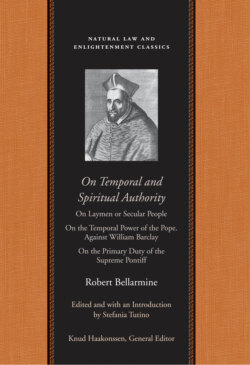Читать книгу On Temporal and Spiritual Authority - Robert Bellarmine - Страница 18
На сайте Литреса книга снята с продажи.
CHAPTER 4 The same is defended from the examples of the Saints
ОглавлениеThe second reason is drawn from examples; for if sovereignty were evil, holy men would never exercise it. However, in Scripture we have very many examples of holy princes, such as Melchizedek king of Salem, the Patriarch Joseph who ruled over the whole of Egypt most advantageously, Moses, Joshua, almost all the judges, David, Solomon, Hezekiah, Jehoshaphat, Josiah, Daniel, Mordecai, Nehemiah, the Maccabees, and others.
In the New Testament we see in John 4 that a certain ruler believed in Christ, and yet he was not commanded to renounce his sovereignty; similarly in Acts 13 the proconsul, converted by Paul, did not abandon the magistracy because of his belief. Then we see that Emperor Philip was accepted by St. Fabian, Pope and Martyr, and by the whole Church, and he was not commanded to abandon his rule as is deduced from Eusebius’s Historia, book 6, chapter 25 [34].
The reason why there is not a greater abundance of examples in the New Testament is that God wanted to begin his Church with poor and humble men, as is said in 1 Corinthians 1, so that the growth of the Church would not be reputed the work of man, which would have happened if it had grown through the favor of princes. Indeed, to the contrary, in the first three hundred years God wanted the Church to be oppressed with all force by rulers all over the whole world, in order thus to demonstrate that the Church was His work and that it was more powerful in suffering than they were in oppressing it.
Hence in epistle 50 [185] Augustine says that God wanted at the beginning to fulfill that part of Psalm 2: “The kings of the earth set themselves, etc.,” and then later that other “Be wise now therefore, O ye kings: be instructed, ye judges of the earth,”42 as indeed we see this fulfilled in Constantine and his successors, since we see Constantine divinely instructed and called by God with a special miracle, as Eusebius reports in book 1 of De vita Constantini. But if sovereignty were evil, why would Christ himself call Constantine to the Church? And, by the way, notice here a discrepancy in this story: in the Historia ecclesiastica of Eusebius translated by Rufinus, book 9, chapter 9, it is written that Constantine in his sleep saw the sign of the cross in the sky and then the angels said to him, “In this sign conquer”; but in De vita Constantini, book 1, Eusebius reports that during a journey Constantine saw, with his own eyes, the sign of the cross above the sun with the letters “In this sign conquer,” and that sign was seen by the whole army. Later at night Christ appeared to Constantine and explained the mystery, and Eusebius heard all this from Constantine himself in person. Therefore it is likely that what we have in the Historia was added by Rufinus.43
Many more examples can be added, those of Jovian, Gratian, Theodosius I and Theodosius II, Charlemagne, Louis the Pious, Otto I, St. Henry the emperor, St. Louis king of France, and many others who either in Britain or in Hungary or in Bohemia or in other regions ruled in a most holy manner. To the opposing argument I say, first, that it is false that princes are for the most part evil; for we do not here discuss a particular kingdom but political sovereignty in general, and such a prince was Abraham along with others. Therefore, just as there were evil princes, such as Cain, Nimrod, Ninus, Pharaoh, Saul, Jeroboam, and other kings of Israel, so there were, by contrast, good princes, such as Adam, Noah, Abraham, Isaac, Jacob, Joseph, Moses, Joshua, almost all the judges, and many kings of Judah.
Second, I say that the examples of evil princes do not prove that political authority is evil, for oftentimes evil men abuse good things, but the examples of good princes rightly prove that political authority is good, since good men do not use evil things. Moreover, even evil princes often benefit more than they hurt, as is clear concerning Saul, Solomon, and others. Finally, it is more useful to the commonwealth to have an evil prince than none, for where there is none the commonwealth cannot last long, as Solomon says in Proverbs 11: “Where no counsel is, the people fall,”44 and where there is a prince, even an evil one, the unity of the people is preserved. See blessed Thomas in Opusculum 20, chapter 6, book 1.
Third, I say that it is due to the wonderful providence of God that among the kings of Israel none was good, for God wanted to allow this because the rebellion of the Israelites from the tribe of Judah signified the separation of the heretics from the Church, as Eucherius teaches at the end of the third book of his commentary on the Book of Kings.45 Just as there are both good and bad kings among Catholics, but no good king can be found among heretics, so even among the kings of Judah there were many good ones and many evil ones, but among the kings of Israel not one good one was to be found.
